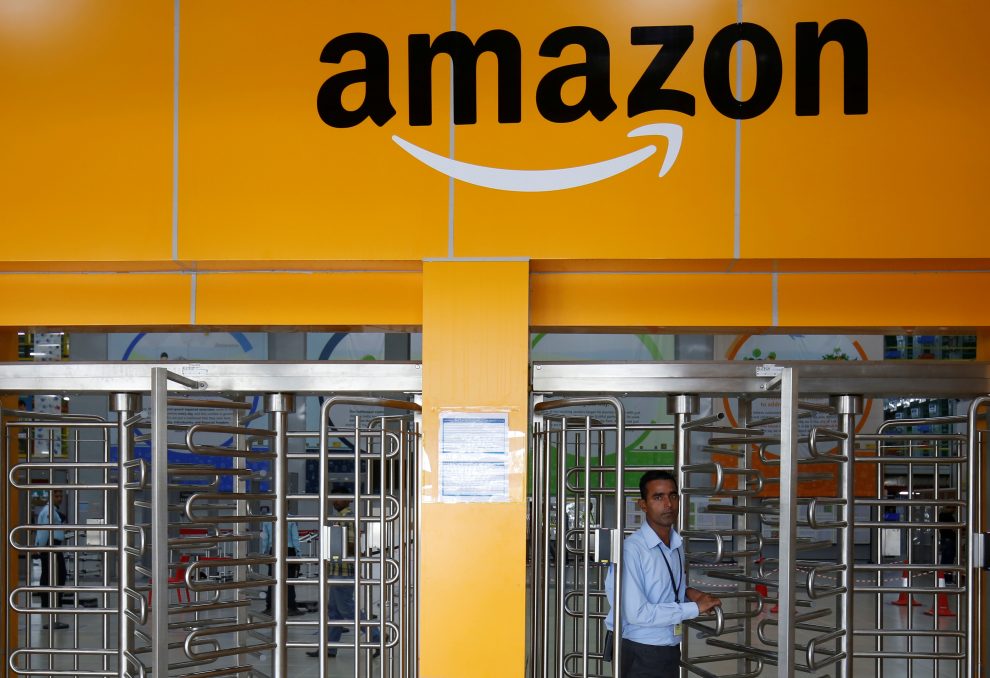Amazon has had an initial win in the battle to acquire Kishore Biyani’s Future Group over Mukesh Ambani’s Reliance Retail Ventures – but some say this is just a temporary setback for Asia’s richest man.
The US retail giant won a favourable ruling on Sunday in its bid to block its former partner, the Future Group, from selling its retail stores to Reliance Industries after a Singapore-based single-judge arbitration panel put the deal on hold, until an arbitration tribunal is formed.
Amazon, which last year bought a 49% stake in Future Coupons Ltd, which owns a 7.3% stake in Future Retail, claims the deal between Ambani’s Reliance Retail and the Future Group breached existing agreements between Amazon and Future.
The US giant started arbitration proceedings on the grounds that its investment came with contractual rights that include a right of first refusal and a pact with non-compete provisions.
But the latest twist in the tussle between the two giants Reliance and Amazon may just be a beating of gums, as the injunction may just be an interim victory for Amazon, legal experts have said.
“The dispute in Singapore Arbitration proceedings hinges upon the extent of the binding framework of Shareholders’ Agreement (SHA) between Amazon and Future Retail,” Mukesh Butani, the managing partner of New Delhi-based BMR Legal Advocates told Asia Financial.
Butani said that in India’s contemporary legal system, while shareholder agreements are largely binding between two joint venture partners (such as Amazon and The Future Group), they cannot have a crippling effect upon the freedom of the parties to do business.
The extent of respective rights of the parties and, more particularly, the extent of their business rights, therefore, could only be tested before the Indian courts.
Titanic Battle
In August, the retail subsidiary of Reliance Industries – Reliance Retail Venture, which is also India’s largest offline retail chain, acquired the retail, wholesale, logistics and warehousing business of Future Group, the second-biggest bricks-and-mortar retailer for $3.4 billion.
That deal not only consolidated Reliance Retail’s position in the country’s still-evolving organised retailing space, but also complicated the future of Amazon and Walmart’s Flipkart businesses in India.
This is a titanic battle for the largest open market globally by users, where e-commerce still accounts for just 3% of all retail sales.
For, aside from widening the gap between its competitors Walmart and Amazon, both of which have pumped in huge investments – $17.2 billion and $6.5 billion respectively – into their Indian operations, Reliance’s Future acquisition dealt a severe blow to Amazon’s growth plan for India, in particular.
The US retail giant has been seeking to boost its Indian foothold as an authorised online sales channel for Future Retail, to sell everything from groceries to cosmetics and apparel. So clearly, Future’s sell-out to Ambani was hard to digest.
Over the last couple of months, Reliance Retail had also attracted billions of dollars of investments from several companies, some of which had previously put large sums into Reliance’s digital venture Jio Platforms, as well.
Part of the money raised by Jio was used to launch Reliance Retail’s online store JioMart, which competes directly with Amazon in the e-commerce space.
Consequently, Amazon drew a battle line with Ambani earlier this month by raising an objection against the Future deal and starting arbitration proceedings.
No Easy Solution
Now, a three-member panel is expected to decide on the matter when it goes to arbitration in Singapore, with Future and Amazon appointing one representative each and a third member being a neutral umpire, who will decide on the dispute in 90 days.
“We welcome the award of the Emergency Arbitrator. We are grateful for the order which grants all the reliefs that were sought. We remain committed to an expeditious conclusion of the arbitration process,” an Amazon spokesperson said in response to the order on Sunday.
But, according to a noted arbitration lawyer in Mumbai, an easy solution is unlikely.
“It is premature to comment upon the implications or final outcome, particularly because Reliance Retail intends to fight it out too,” the person told AF on condition of anonymity due to the sensitivity of the matter.
In a media release on Monday, Reliance Retail said it “has entered into the transaction for acquisition of assets and business of Future Retail Limited under proper legal advice and the rights and obligations are fully enforceable under Indian Law.”
“(And the company) intends to enforce its rights and complete the transaction in terms of the scheme an agreement with Future group without any delay.”
More Trouble for Amazon
Meanwhile, Amazon is under fire as well from a parliamentary panel in India in connection with the country’s data protection and security.
Reuters reported on Monday that representatives of Amazon India have refused to appear before the panel reviewing the national Personal Data Protection Bill on October 28 (this Wednesday) as it could lead to “coercive action” against the company.
India has been drafting several regulations for the technology sector. But industry executives say the bill could hurt investment plans of foreign technology giants.
The Indian government is also considering a new policy for the e-commerce sector and to regulate so-called “non-personal” data.
Data protection has become a matter of global concern, and a necessary issue for all countries, so these concerns are also putting a further burden on corporates to meet new requirements.
“For Amazon, therefore, the Personal Data Protection Bill may be an added point of evaluation for figuring out the feasibility of investing in India,” the Mumbai-based lawyer said.
“It will be interesting to see if these issues (the data protection bill and Reliance’s Future deal) put Amazon’s India plans in jeopardy,” he said.
• Indrajit Basu, with reporting by Reuters
This report was updated on January 9, 2022 for style purposes.
READ MORE:
Reliance offers India’s growth story to its strategic and tactical investors
Mukesh Ambani favours bricks as much as clicks
























